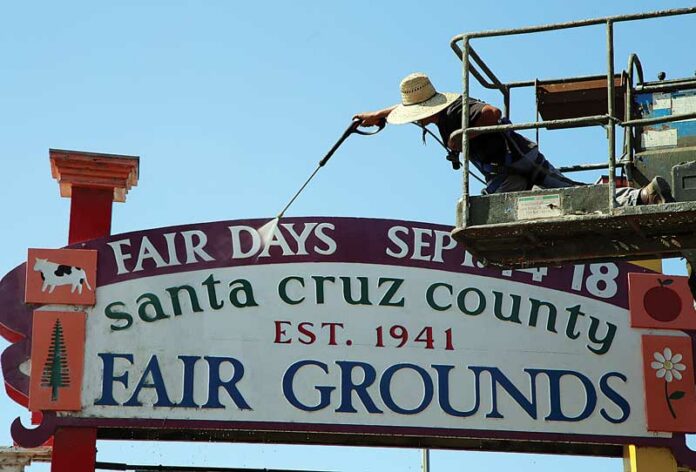WATSONVILLE—Santa Cruz County Fair Board President Don Dietrich has taken over as CEO in the wake of the Oct. 4 dismissal of Dave Kegebein, and says he’ll stay at the helm as the Board recruits a replacement.
It is unclear how long that could take, Dietrich says, but added that the picture will likely be clearer after the next Fair Board meeting on Oct. 25. If the process seems likely to drag out more than a few months, his seat on the nine-member Board will likely be filled.
In the meantime, he says that things are running “seamlessly” at the fairgrounds, thanks to the staff and workers tasked with day-to-day operations.
“They are taking care of business like they always have, and always will,” he said.
Kegebein was fired after an audit from the California Department of Food and Agriculture showed that more than $100,000 was charged to a state-issued credit card, most of which was for fuel and maintenance for his truck. At issue was whether the charges were legitimate, and that the receips were not duly submitted to the State.
Kegebein acknowledged that he should have done so, but said that some of the charges came because he used his truck for fairground business, putting more than 200,000 miles on it by his estimation. He said in a text message Tuesday that he will release a detailed response to the audit soon.
Dietrich says he plans to run the fair until a replacement is found. He rejects assertions that Kegebein’s termination was an attempt to take over the Fairgrounds.
“As far as taking over, I don’t know that I would say that,” he said. “I’m just there to make decisions that are above (staff’s) comfort level to make. But they know what they are doing.”
In addition to the financial allegations—which include more than $5,000 for “unallowable” purchases such as birthday celebrations, employee lunches and holiday dinners—the audit also looked at the fairgrounds as a whole, criticizing the institution for not forging an agreement with the Fairgrounds Foundation—the fair’s fundraising arm. It also states that the Fairgrounds failed to pay overtime to employees and didn’t keep track of who used an onsite fuel tank.
Dietrich said he didn’t want to “point fingers” at the all-volunteer board in regards to those allegations, but acknowledged that some of the items in the audit need to be addressed.
“We probably should have done some of this stuff years ago,” he said. “When it comes to light like this, it just means you need to do it now before you get past it and the memories fade. There is a lot of policy work that has to be done to make sure we put up guard rails and checks and balances to make sure this doesn’t happen again.”
Realtor and fair volunteer John Skinner said the decision caught many people off guard, particularly since the Fairgrounds are in good shape, both physically and financially.
It boasts revenues of $4 million last year, and a $1.75 million reserve, by Kegebein’s estimation. That’s a monumental change from a decade earlier, when revenues were less than half that, and there was nothing in reserve.
“We have a Fairgrounds which has moved from insolvency to a very well run cornerstone of our community largely due to the efforts of one man, who has literally thrown everything he had into the transformation,” Skinner wrote in a letter to the community.
Skinner said he trusts Kegebein “implicitly” after knowing him for 30 years.
“…And based on the managers who preceded him, I would say there is no chance of replacing him with anyone nearly as effective,” Skinner said.
He added that anyone currently involved with the Fairgrounds should stick with it, despite the current situation.
“While our first reaction may be to walk away from the Fairgrounds, we should remember that this is Dave’s legacy and a very important part of our community,” he said.
Watsonville Realtor Chuck Allen, who managed the fair for five years in the 1960s, said his involvement began long before that, when he entered a poultry project as a 10-year-old 4-H member.
It is experiences like his, he says, that make it vital the Fairgrounds remains.
“It is contributing significantly to the foundation of those individuals,” he said. “The fair and the fairgrounds and all that it represents is a big part of who we are.”
Managing a state-run institution such as a fairgrounds can be frustrating, Allen says, with both the CDFA and Fair Board watching.
Even with that level of scrutiny, the CDFA didn’t perform an audit during a 10-year stretch before the most recent one came out. But it was this that the Board used as justification for Kegebein’s termination.
“What was unorthodox is that they used a prelim audit, but didn’t have any opportunity to answer,” Allen said. “They just used it as a means to a goal—which was to get rid of David. And he still hasn’t had a chance to respond.”
What is important now, Allen says, is to maintain the levels of participation, and to watch what happens next with the Fairgrounds.
“It’s a time when we all have to come together as a community and really continue to be engaged as much or more than we’ve ever been,” he said.













good luck.